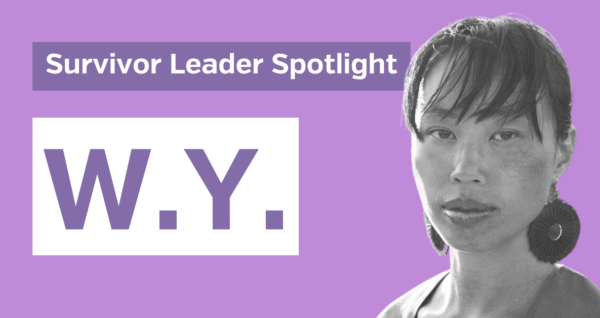This Domestic Violence Awareness Month (DVAM), we’re spotlighting some of our incredible Survivor Leaders, former clients of Sanctuary who go through a 12-week training and certification course to prepare them to make system-wide change through advocacy, training, program development, and working directly with other survivors.
Having a self-care practice while I was liberating myself from DV has been essential in my sanity, and the success of my and my child’s outcome. I often asked myself why didn’t I have this in place sooner, especially when I was still in the relationship with the abuser. It’s not until I had distance from him and the situation that I understood that I was in daily survival mode — there was no space to cultivate my stillness, awareness, and inner strength. The following practices have not just helped me, but have really made all the difference, in who I am today. I can say that I’ve transcended the victim and survivor phases of trauma, and am now thriving. I hope every person who has been a victim of any form of DV gets to this place within themselves and in their lives because they deserve to.
After being in survival mode for years, having my sympathetic nervous system activated non-stop, my nervous system needed a huge rest. Any practice that revolves around stillness or slow-pace and body/mind awareness will help regulate the nervous system. For me, it was meditation. Having at least 2 hours to myself daily to be still was essential. I meditated anywhere from 1-2 hours, for almost 2 years straight. I never set a timer..I just got up when I was ready. I also experienced that “witnessing” during meditation that I’ve heard about from serious meditators and monks. This was truly healing as I was able to view matters and people (including the abuser) from a higher, detached perspective. The majority of my emotional healing has come from my meditation experiences. These sessions brought understanding and compassion to my life in extremely profound ways…in essence enlightenment. I also allowed (and still do) myself to sleep-in whenever possible, and to have lazy-days. If sleeping-in isn’t an option, then I get to bed super early like 8pm to get 10-12+ hours of sleep. Your nervous system and entire body is healing during this time.
The other practice is something that allows recording of reflections, and emptying of thoughts and feelings. I journaled as much as possible. It’s a way to dump out raw thoughts and feelings to get out of my system without directing that energy onto anyone else. It’s also a great tool for reflecting. Journaling allows me to look back at entries to see how far I’ve come in my healing journey. I tend to also sleep better when I journal before bed. It’s a space to free up my mental and not take things into my sleep. I used to use notebooks, but that fills up quickly and where does one put tens of dozens of notebooks?! An app like Evernote or Apple Notes is great because it’s automatically dated, and you can search for key words or dates whenever you want to look back at older entries. If journaling might not be your thing, recording voice notes is a great alternative.


“I can say that I’ve transcended the victim and survivor phases of trauma, and am now thriving. I hope every person who has been a victim of any form of DV gets to this place within themselves and in their lives because they deserve to.”
Both journaling and meditation are something I’ve done prior to experiencing DV, so it felt natural to use familiar tools — although there are numerous other practices that can offer the same support. And although I did these things intensely during this time period, I don’t at the moment need to sit daily nor for that length of time. I’m in a better place internally and externally, and am grateful that the biggest to smallest things were aligned for me to have and experience these practices during a critical time in my life; most especially throughout the family court case.
The last thing I’d like to share isn’t a healing practice, although it may provide some relief with further abuse. While the custody and DV case was in family court, I wish I would’ve requested that any communication required with the abuser pertaining to our child be thru a communication app. There are apps like OurFamilyWizard and TalkingParents that are created for this type of communication. Whereas text messages/emails can get a little tricky to gather and present as evidence, these apps don’t allow deletion or changes to the messages exchanged, so there can’t be any manipulation of context, and are widely accepted by courts as admissible evidence. I only found out about this years into the court case and didn’t occur to me then to request this even for the temporary OOP. The OOP petitioner may request communication clauses in an OOP, which I did since overnight visitations were granted between my child and the abuser. And he did abuse that access to me. Since we now use the app, his written interactions with me have calmed down a lot because he knows this could be unquestionable admissible evidence.
Every person’s situation is different, and I recognize I had a certain privilege to be able to do have this type of time and physical space, but I encourage survivors to try however they can to create and make space for a self-care/healing practice because it can only be empowering.
Join W.Y. in standing with survivors of gender violence. Your gift supports Sanctuary’s life-saving work with thousands of families escaping abuse.
